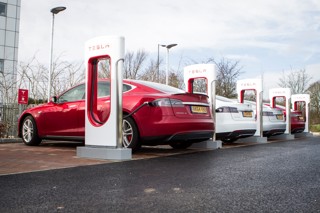Cap HPI has warned that further ‘significant reductions’ in used electric vehicle (EV) prices are expected after Tesla’s Model 3 lost a quarter of its value in less than four months.
Following on from director of valuations Derren Martin’s appraisal of the market yesterday (January 16) the valuations providers head of forecast strategy, Dylan Setterfield, warned that downward pricing adjustments are expected after values “remained stronger for longer than anticipated in the face of prolonged new car supply issues”.
Cap HPI stated that values that were previously unsustainably high and asserted that downward pricing movements would not herald a collapse in demand for EVs.
 Setterfield said: “Used values for many battery electric models were strong through 2022. In many cases, nearly new retail values were above list price, some by a considerable margin. This was clearly unsustainable, and our forecasts reflected that, with large negative adjustments applied.”
Setterfield said: “Used values for many battery electric models were strong through 2022. In many cases, nearly new retail values were above list price, some by a considerable margin. This was clearly unsustainable, and our forecasts reflected that, with large negative adjustments applied.”
Tesla’s residual values have stolen the headlines in recent weeks, with Cap HPI stating today that a 25% (£11,600) loss in value since the middle of September for the average one-year-old Tesla Model 3 Long Range with 20,000 miles on the clock had actually been less than expected.
Fears that used Teslas could see a further decline in value were prompted by the OEM’s move to cut its new car prices last week, just days after Society of Motor Manufacturers and Traders (SMMT) data showed that it had made almost a third of its 2022 new car registrations in December alone.
Yesterday, Martin told AM that EV values were declining around four times faster than their petrol counterparts.
This is partly as a result of growing supply and partly “consumer pushback” in light of growing electricity costs and media coverage of queues at public charge points over the festive period.
Setterfield, who debated used EV values on the AM News Show podcast, said that the market segment’s vehicle valuations were now transitioning to a “more realistic, sustainable levels”.
“For some models, there is more adjustment to come – there are still vehicles with used values above list price and significant reductions are expected in these cases over the coming months,” he said.
“The total cost of ownership situation generally remains favourable for EVs. Even with fuel prices continuing to decline at the pump, any sensible charging regime still sways the economic equation.
“The implementation and ongoing development of clean air zones is also likely to continue to support demand for used BEVs. The ongoing pricing realignment actually helps in that regard, making BEVs more affordable.”
Last week a Net Zero Review delivered on behalf of the Department for Business, Energy & Industrial Strategy (BEIS) recommended the swift delivery of an electric vehicle (EV) mandate and VAT cuts to make public charging more affordable.
Today (January 17) the UK Government revealed a new Electric Vehicle Smart Charging Action Plan which, it believes, could save high-mileage electric vehicle (EV) drivers up to £1,000 per year.



















Login to comment
Comments
No comments have been made yet.